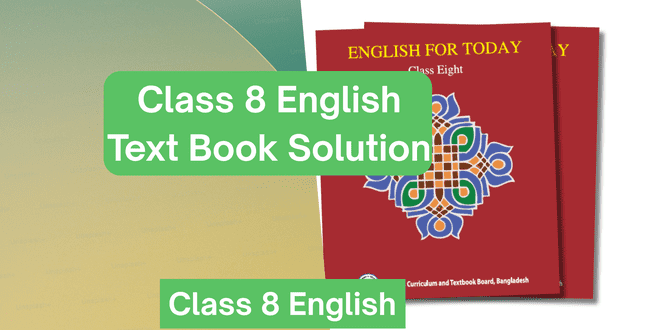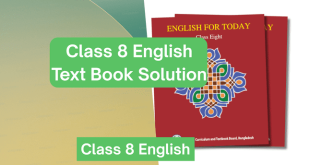Class 8 English Unit 7 Lesson 5 Refugees: Marwan, in the long summers of childhood, when I was a boy the age you are now, your uncles and I spread our mattress on the roof of your grandfather’s farmhouse outside of Homs.
Class 8 English Unit 7 Lesson 5 Refugees:
Unit 07 Lesson 05 Refugees – শরণার্থী বা উদ্বাস্তু
A. Look at the picture and discuss in groups the possible answers to the questions (ছবিটি দেখো এবং প্রশ্নগুলোর সম্ভাব্য উত্তর নিয়ে দলগতভাবে আলোচনা করো।)
1. What comes first in your mind when you look at the image? (যখন তুমি ছবিটি দেখো তখন প্রথমে তোমার মনে কী চিন্তা আসে?)
2. What is the relationship between the child and the man? (শিশুটি ও ব্যক্তিটির মধ্যে সম্পর্ক কী?)
Ans.
A group discussion on the possible answers to the questions is given below: (প্রশ্নগুলোর সম্ভাব্য উত্তরের ওপর একটি দলগত আলোচনা নিচে দেওয়া হলো:)
Arif : Hello, friends. How do you do? (হ্যালো, বন্ধুরা, তোমরা কেমন আছো?)
Abir : We are fine. And you? (আমরা ভালো আছি। আর তুমি?)
Arif : I am as usual. By the way let’s discuss about the possible answers to the questions of lesson five named ‘Refugees’, (আমি যথারীতি আছি। যাহোক, চলো ‘শরণার্থী বা উদ্বাস্তু’ নামক পঞ্চম লেসনের প্রশ্নগুলোর সম্ভাব্য উত্তর নিয়ে আলোচনা করি।)
Ritu : Ok. Let’s start. What comes first in your mind when you look at the image? (ঠিক আছে। চলো শুরু করা যাক। যখন তুমি ছবিটি দেখো তখন প্রথমে তোমার মনে কী চিন্তা আসে?)
Arif : The image immediately reminds me of a moment of deep emotional connection. It feels like a gesture of comfort or protection. Abir, what do you want to say? (এই ছবিটি তৎক্ষণাৎ আমাকে গভীর আবেগময় সংযোগের একটি মুহূর্তের কথা মনে করিয়ে দেয়। এটি আরাম বা সুরক্ষার একটি অনুভূতি প্রদান করে। আবির তুমি কী বলতে চাও?)
Abir : I see a sense of solace, as though the man is shielding the child from something or offering reassurance. What is your opinion, Ritu? (আমি স্বস্তির অনুভূতি দেখি, যেন ব্যক্তিটি শিশুটিকে কোনোকিছু থেকে রক্ষা করছেন বা আশ্বাস দিচ্ছেন। তোমার মতামত কী, ঋতু?)
Ritu : The sketch style makes me think about raw emotions like love and vulnerability, maybe during a time of hardship. (অঙ্কনটির ধরন আমাকে ভালোবাসা ও দুর্বলতার মতো স্বভাবগত আবেগের কথা স্মরণ করিয়ে দেয় যা সম্ভবত কোনো কঠিন সময়ে প্রকাশ পায়।)
Arif : All right. We have got love, emotional attachment and protection from the first question. Now it is time to discussion on the second question. What is the relationship between the child and the man? Ritu first. (ঠিক আছে। প্রথম প্রশ্ন থেকে আমরা পেলাম ভালোবাসা, আবেগময় অনুরাগ এবং সুরক্ষা। এখন দ্বিতীয় প্রশ্ন নিয়ে আলোচনা করার সময়। শিশুটি ও ব্যক্তিটির মধ্যে সম্পর্ক কী? ঋতু প্রথমে বলবে।)
Ritu : It looks like a father and child. The way the man holds the child feels protective and caring. Say your opinion, Arif. (এটি বাবা ও সন্তানের সম্পর্কের মতো মনে হয়। মানুষটি যেভাবে শিশুটিকে ধরে রেখেছে, তা সুরক্ষামূলক ও যত্নশীলের অনুভূতি প্রদান করে। তোমার মতামত বলো, আরিফ।)
Arif : I agree, but it could also be a guardian or someone deeply empathetic possibly an uncle or older brother. What do you think, Abir? (আমি একমত, তবে এটি একজন অভিভাবক বা গভীর সহানুভূতিশীল কেউও হতে পারে- সম্ভাবত একজন চাচা বা বড়ো ভাই। তুমি কী মনে করো আবির?)
Abir : It might not even be familial. The relationship could symbolize humanity’s shared compassion during difficult times, especially given the abstract quality of the sketch, (এটি পারিবারিক সম্পর্ক নাও হতে পারে। এই সম্পর্কটি মানবতার ভাগাভাগি করা সহানুভূতি ও সুরক্ষার প্রতীক হতে পারে বিশেষ করে অঙ্কনটির বিমূর্ত গুণাবলীর কারণে।)
Arif : Excellent discussion! Now we have got clear idea about the answers of the questions. Thank you all. (চমৎকার আলোচনা! এখন আমরা প্রশ্নগুলোর উত্তর সম্পর্কে স্পষ্ট ধারণা পেয়েছি। তোমাদের সবাইকে ধন্যবাদ।)
Ritu : Thank you, too. (তোমাকেও ধন্যবাদ।)
Class 8 English ⮯
| গাইড ও সাজেশন পেতে আমাদের অ্যাপটি ইন্সটল করো 👉 Install Now |
B. Now, read the text titled “Sea Prayer” by Khaled Hosseini and answer the questions that follow: (এখন খালেদ হোসাইনি-এর “Sea Prayer” (সমুদ্র প্রার্থনা)” শীর্ষক লেখাটি পড়ো এবং নিচের প্রশ্নগুলোর উত্তর দাও।]
Marwan, in the long summers of childhood, when I was a boy the age you are now, your uncles and I spread our mattress on the roof of your grandfather’s farmhouse outside of Homs.
আমার প্রিয় খারওয়ান, শৈশবের দীর্ঘ গ্রীষ্মকালে, যখন আমি তোমার মতো বয়সের একটি বালক ছিলাম তখন তোমার চাচারা ও আমি তোমার দাদার হোমসের বাইরের খামারবাড়ির ছাদে আমাদের বিছানা বিছাতাম।
We woke in the mornings to the stirring of olive trees in the breeze, to the bleating of your grandmother’s goat, the clanking of her cooking pots, the air cool and the sun a pale rim of persimmon to the east. We took you there when you were a toddler.
সকালবেলা আমরা জেগে উঠতাম বাতাসের সাথে জলপাই গাছের নড়াচড়া, তোমার দাদির ছাগলের ডাক, তার রান্নার হাঁড়ির শব্দ, ঠান্ডা হাওয়া আর পূর্ব দিগন্তে হালকা কমলা রঙের সূর্যের আলো দেখে। তোমাকে আমরা সেখানে নিয়ে গিয়েছিলাম যখন তুমি অনেক ছোটো ছিলে।
I have a sharply etched memory of your mother from that trip, showing you a herd of cows grazing in a field blown through with wild flowers.
সেই ভ্রমণ থেকে তোমার মায়ের একটি স্মৃতি আমার মনে গভীরভাবে আঁকা আছে, তিনি তোমাকে এক ঝাঁক গোরু দেখাচ্ছিলেন যেগুলো বুনো ফুলে ভরা একটি মাঠে চরে বেড়াচ্ছিল।
I wish you hadn’t been so young.
আমার মনে হয় যদি তুমি এতো ছোটো না হতে।
You wouldn’t have forgotten the farmhouse, the soot of its stone walls, the creek where your uncles and I built a thousand boyhood dams.
তাহলে তুমি খামারবাড়ি, এর দেয়ালে লেগে থাকা ঝুল, ছোটো নদীটি যেখানে তোমার চাচারা ও আমি এক হাজার শিশুসুলভ বাঁধ তৈরি করেছিলাম তা ভুলে যেতে না।
I wish you remembered Homs as I do, Marwan.
আমার মনে হয় যদি তুমি আমার মতো করে হোমসকে মনে রাখতে, মারওয়ান।
In its bustling Old City, a mosque for us Muslims, a church for our Christian neighbours, and a grand souk for us all to haggle over gold pendants and fresh produce and bridal dresses.
এটির কর্মব্যস্ত পুরাতন শহর, যেখানে আমাদের মুসলমানদের জন্য একটি মসজিদ, আমাদের খ্রিস্টান প্রতিবেশীদের জন্য একটি গির্জা এবং আমাদের সবার জন্য একটি বড়ো বাজার ছিল যেখানে সোনার দুল, তাজা পণ্য এবং বিয়ের পোশাকের দর কষাকষি হতো।।
I wish you remembered the crowded lanes smelling of fried kibbeh and the evening walks we took with your mother around Clock Tower Square.
আমার মনে হয় যদি তুমি জনাকীর্ণ গলিগুলোতে ভাজা কিববেহ-এর সুবাস এবং ক্লক টাওয়ার স্কয়ার ঘিরে তোমার মায়ের সাথে আমাদের সান্ধ্যকালীন হাঁটাহাঁটি মনে রাখতে।
But that life, that time, seems like a dream now, even to me, like some long-dissolved rumour.
কিন্তু সেই জীবন, সেই সময় এখন এমনকি আমার কাছেও একটি স্বপ্নের মতো মনে হয়, যেন বহু আগে মিলিয়ে যাওয়া একটি গুজব।
First came the protests. Then the siege.
প্রথমে এলো প্রতিবাদ। তারপর অবরোধ।
The skies spitting bombs. Starvation. Burials. These are the things you know. You know a bomb crater can be made into a swimming hole. You have learned dark blood is better news than bright.
আকাশ থেকে বোমার বর্ষণ। অনাহার। দাফন। এই জিনিসগুলো তুমি জানো। তুমি জানো যে বোমার আঘাতে তৈরি একটি গর্ত সাঁতার কাটার জায়গা হতে পারে। তুমি শিখেছো যে গাঢ় রক্তের খবর উজ্জ্বল রক্তের খবরের চেয়ে ভালো।
You have learned that mothers and sisters and classmates can be found in narrow gaps between concrete, bricks and exposed beams, little patches of sunlit skin shining in the dark.
তুমি শিখেছো যে মায়েরা, বোনেরা এবং সহপাঠীরা কংক্রিট, ইট আর উন্মুক্ত বিমের সংকীর্ণ ফাঁক-ফোকরে পাওয়া যেতে পারে, যাদের রোদে আলোকিত ত্বকের ছোটো ছোটো টুকরো অন্ধকারে উজ্জ্বল হয়ে ওঠে।
Your mother is here tonight, Marwan, with us, on this cold and moonlit beach, among the crying babies and the women worrying in tongues we don’t speak. Afghans and Somalis and Iraqis and Eritreans and Syrians. All of us impatient for sunrise, all of us in dread of it. All of us in search of home.
মাওয়ান, তোমার মা আজ রাতে এখানে আমাদের সাথে ঠান্ড ও চাঁদের আলোয় আলোকিত সৈকতে এই ক্রন্দনরত শিশুদের এবং আমাদের অজানা ভাষায় দুশ্চিন্তা প্রকাশকারী এই মহিলাদের মাঝে আছেন। আফগান, সোমালিয়ান, ইরাকি, ইরিত্রিয়ান এবং সিরিয়ান- আমরা সবাই সূর্যোদয়ের জন্য অস্থির, আমরা সবাই এটির ভয়ে কাঁপছি। আমরা সবাই বাড়ির খোঁজ করছি।
I have heard it said we are the uninvited. আমি এটি বলতে শুনেছি যে আমরা অবাঞ্চিত।
We are the unwelcome. We should take our misfortune elsewhere. আমরা অনাহূত। আমাদের দুর্ভাগা অন্য কোথাও নিয়ে যাওয়া উচিত।
But I hear your mother’s voice, over the tide, and she whispers in my ear, “Oh, but if they saw, my darling, Even half of what you have. কিন্তু আমি জোয়ারের ওপর দিয়ে ভেসে আসা তোমার মায়ের কন্ঠ শুনতে পাই, সে আমার কানে ফিসফিস করে বলে, “ওহ, কিন্তু তারা যদি দেখতো, প্রিয়তম। এমনকি তোমার যা আছে তার অর্ধেকও।
If only they saw. They would say kinder things, surely.” যদি শুধুমাত্র তারা দেখতো। তবে নিশ্চিতভাবে আরও সদয় কিছু বলতো।”
I look at your profile in the glow of this three-quarter moon, my boy, your eyelashes like calligraphy, closed in guileless sleep. আমি এই তিন-চতুর্থাংশ পূর্ণিমার আলোয় তোমার মুখের দিকে তাকাই, আমার সোনামনি, তোমার চোখের পাপড়ি যেন শিল্পস্বরূপ হস্তলিপি, নিষ্পাপ ঘুমে বন্ধ।
I said to you, “Hold my hand. Nothing bad will happen.” আমি তোমাকে বলেছিলাম, “আমার হাত ধরো। খারাপ কিছুই হবে না।
These are only words. A father’s tricks. It slays your father, your faith in him. Because all I can think tonight is how deep the sea, and how vast, how indifferent. How powerless I am to protect you from it. All I can do is pray. এগুলো শুধুই কথার কথা। একজন বাবার কৌশল। তোমার বাবার ওপর তোমার আস্থা তাকে খতম করে দিচ্ছে। কারণ। আজ রাতে আমার একমাত্র চিন্তা এই যে সমুদ্র কত গভীর, কত বিশাল, কতই নির্বিকার। আমি তোমাকে এর থেকে রক্ষা করতে কতটাই না অসহায়। আমি কেবল প্রার্থনা করতে পারি।
Pray God steers the vessel true, when the shores slip out of eyeshot and we are a flyspeck in the heaving waters, pitching and tilting, easily swallowed. Because you, you are precious cargo, Marwan, the most precious there ever was. I pray the sea knows this. Inshallah.
প্রার্থনা করি যে ঈশ্বর নৌকাটি সঠিক পথে চালনা করবেন যখন তীর দৃষ্টির বাইরে চলে যাবে এবং আমরা চলমান জলের ওপর একটি বিন্দুতে পরিণত হবো, উঠানামা করবো এবং সহজেই গ্রাস করা যাবে। কারণ তুমি, অমূল্য সম্পদ, মারওয়ান, সবচেয়ে অমূল্য যা কখনও ছিল। আমি প্রার্থনা করি সমুদ্র এটা আনে। ইনশাআল্লাহ।
How I pray the sea knows this. কীভাবে আমি প্রার্থনা সমুদ্র তা জানে।
Note (টীকা)
Etched (খোদাইকৃত) – Deeply marked or engraved in memory. (স্মৃতিতে গভীরভাবে খোদাই বা চিহ্নিত।)
Rersimmon (পার্সিমন) – A type of orange fruit; here, it describes the pale color of the sun. (এক প্রকার কমলা রঙের ফল; এখানে, এটি সূর্যের মলিন বর্ণকে বর্ণনা করে।)
Soot (স্কুল) – Black powder or ash left from fire or smoke. (আগুন বা ধোঁয়া থেকে উৎপন্ন গুঁড়ো বা ছাই।)
Bustling (কর্মব্যস্ত) – Full of energy and movement, busy. (শক্তি ও গতিময়তায় ভরপুর, ব্যস্ত।)
Haggle (দর কষাকষি করা) – To bargain or argue over the price of something. (কোনোকিছুর মূল্য নিয়ে দর কষাকষি বা তর্ক করা।)
Siege (অবরোধ) – A military attack where enemies surround a place and cut off supplies. (একটি সামরিক আক্রমণ, যেখানে শত্রুরা একটি স্থান ঘিরে ফেলে এবং সরবরাহ বন্ধ করে দেয়।)
Crater (বোমার আঘাতে সৃষ্ট গর্ত)- A large hole made by an explosion. (কোনো বিস্ফোরণের মাধ্যমে তৈরি হওয়া একটি বড়ো গর্ত।)
Guileless (নিষ্পাপ) – Innocent, without trickery or deceit. (নির্দোষ, কোনো ধোকাবাজি বা প্রতারণা ছাড়া।)
Heaving (উঠানামা) – Moving up and down, as in the motion of the sea. (উপরে-নিচে চলমান, যেমন সমুদ্রের ঢেউয়ের গতিবিধি।)
Flyspeck (খুবই ছোটো)- Something very small, like a tiny dot. (খুবই ছোটো, যেমন একটি ক্ষুদ্র বিন্দু।)
Pitching (উঠানামা) – Moving up and down suddenly, especially in rough waters, (হঠাৎ উপরে-নিচে উঠানামা, বিশেষ করে উত্তাল পানিতে।)
 Codehorse Learn Free
Codehorse Learn Free


